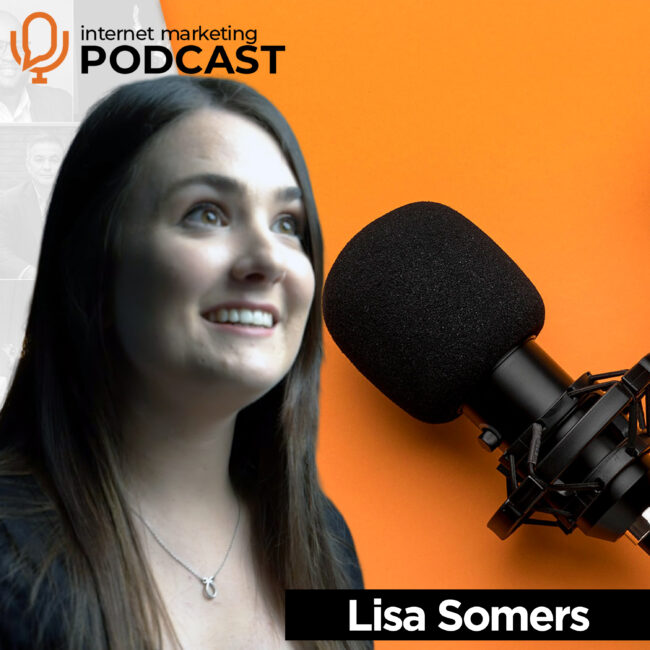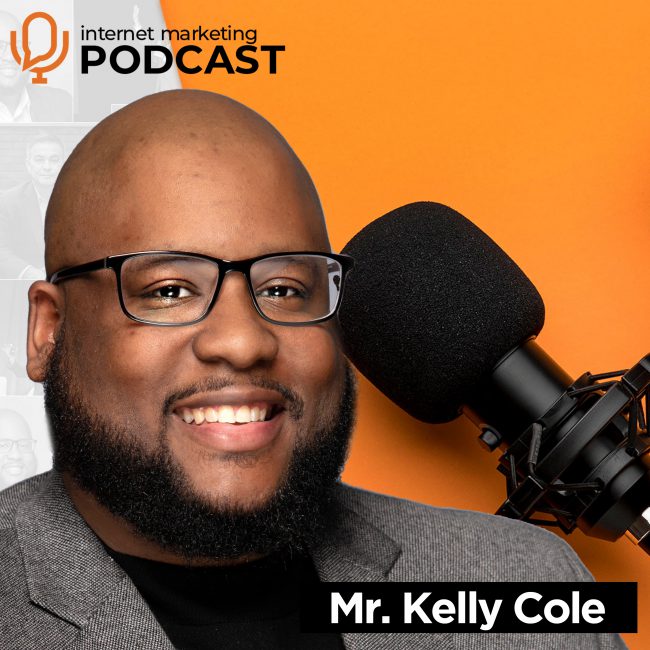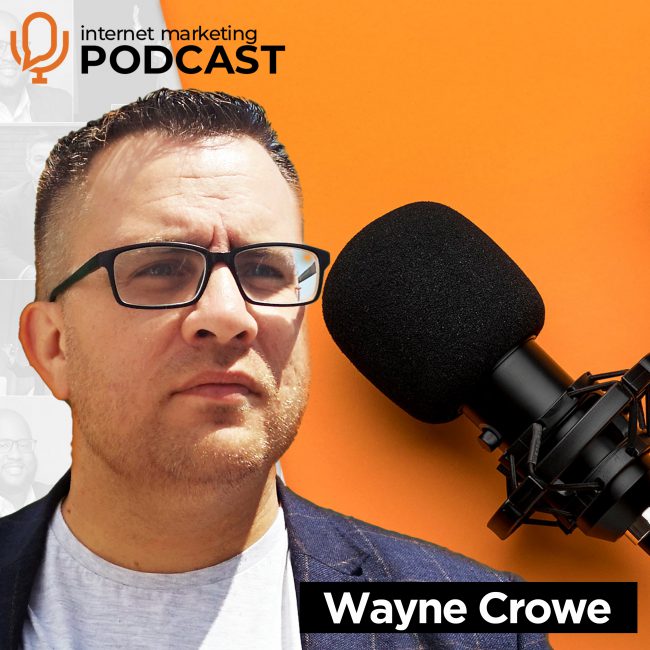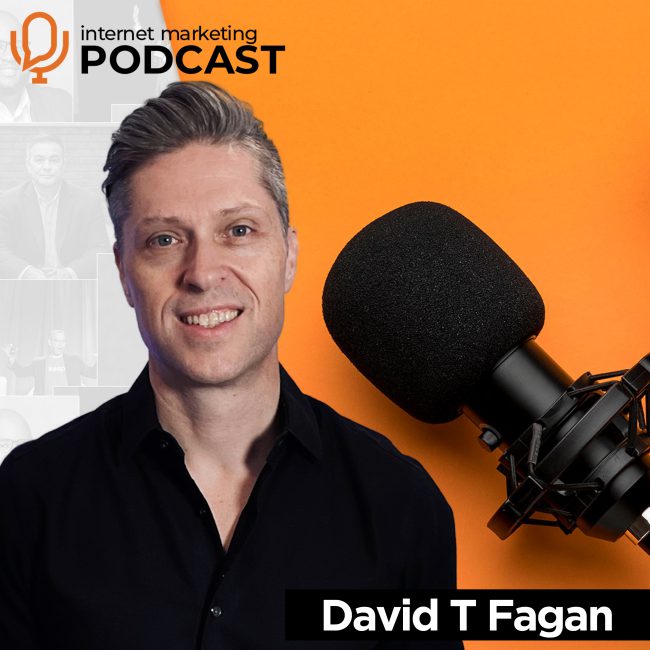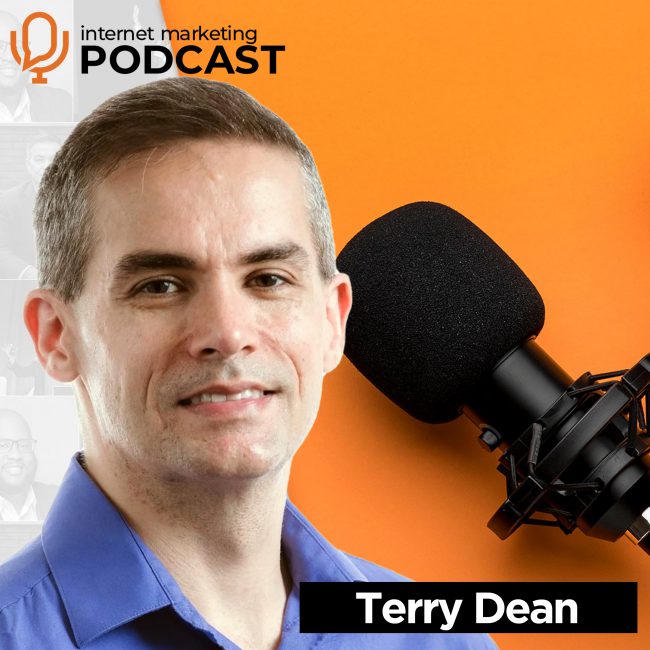
About this Podcast:
This time, we’re talking with the internet lifestyle mentor, Terry Dean. Now, he’s been coaching entrepreneurs on how to earn more, work less, and enjoy life since 1996. So with over a quarter of a century’s worth of experience under his belt, I’m excited to dive in.
Episode Transcript:
Editor:
This time, we're talking with the internet lifestyle mentor, Terry Dean. Now, he's been coaching entrepreneurs on how to earn more, work less, and enjoy life since 1996. So with over a quarter of a century's worth of experience under his belt, I'm excited to dive in. Terry Dean. It's great to meet you.Terry Dean:
It's great to be here.Editor:
Well, 26 years, it's quite a long time. So you must be doing something right. How did it all start for you?Terry Dean:
Well, it started off, as you mentioned back in 1996. And I was a pizza delivery driver for Little Caesars. And that was my last of many dead end jobs, such as I signed people up for credit cards in front of Sears. I tried selling satellite dishes door-to-door. I sold a grand total of zero over two weeks, they let me go pretty quickly. And then the last job was delivering pizzas. That was the last job I had, and the last job I ever will have. And at that point in time, '96 was really early on. The internet was just getting started. And I heard a few stories of people who started online with basically what you'd consider kitchen table type businesses. They go to online and they were selling, way back then it was VHS videos, self-help type videos, things like that. And I basically said, "You know what? This is something I could do." I was never able to sell one-on-one, sell directly. I was probably the worst salesperson you'd ever seen. But I said, "With the internet, this is something that I can hide behind a screen, and I can write to people. I can communicate people. I can rethink my thoughts on paper with all the editing process and everything else. And this is something that I could do." So I start off by going to Best Buy. And this was one of our last credit cards that still had money on it. It was a Best Buy credit card, because we had a lot of other debts at the time from failed business opportunities. We had a basement full of junk that I had bought trying to go into network marketing, trying to do direct mail, things like that. And I had always failed going into it. So I was a failure going somewhere to happen. But I started online. I bought my first PC at Best Buy. It was a Pentium-75, which is now a paperweight at best. And I went on CompuServe. Many of the younger people don't even know what it is, CompuServe. But I started there. And this is funny because this was before social media, before anything like this. But I started inside the message boards on CompuServe, because they had a whole bunch of different message boards about different topics. And I went into some of the ones that were about direct mail. That were about online. That were about things like email. And I started participating in these boards and sharing content and looking for questions that people were asking. And I started answering those questions at the same time. I started studying from what I consider some of my mentors, although I didn't deal with them directly at the time. I started studying products by Gary Halbert and Jay Abraham. And eventually, I grew a little bit more in the business. I hired John Carlton to coach me on the copywriting side. And I was learning and then answering questions. And I started building an email list back then. And that was probably the smartest thing I ever did, was starting that email list. And the way it worked is I would just communicate with people, answer questions. I would give a link to, "Hey, you can go download this freebie by joining my email list." My email list started growing. I started earning an income. It was several months in and within that first year, I pretty much had a full-time income. It wasn't a great full-time income. Because remember, I was a pizza delivery driver. It was a full-time income replacing that, not a medical doctor type income, but I got there. And as I said, the smartest thing I did was building that email list because about six months in, I realised that my income was directly proportional to the size of my email list. If my email list grew, so did my income. And I communicated with people back then, I was afraid if I communicated too often, they would tune me out. So I only sent like one email a week. That I've learned since then, you can send multiple emails per day if you have something good to say to your audience. But back then, I limited myself to one email a week. And that's where my business really started from, was just communicating with people. And I bought reprint rights, basically licences to several, again, VHS videos, back then there were self-help videos, videos of people like Mark Victor Hansen and people like that, that I'm sure some will know. There's others as well. And I started selling those VHS videos and we're again, going way back in '96. I had this big duplicator set up of VHS videos and I would duplicate all the videos, and we would mail them out to our customers. And that was really where my business began. It began with, we'll say social media of that day, of building a list and answering questions, and then getting them on my email list. So basically going out, getting traffic, giving content. I was one of the first content marketers online, probably, you would say at least on the small scale side of it. And building an email list and then selling products. So that was pretty much my early beginnings, which isn't a whole lot different than what people do today, even though that's Stone Age of the internet.Editor:
Stone Age, indeed. The funny thing is, it's an introvert's dream, I guess, this kind of business. Because as you say, you can hide behind your computer screen. The interesting part there, Terry, that you talked about is the fact that you were duplicating VHS video cassettes. Now, that is quite a challenge to do because of course people say, "Oh, it's so much easier on the internet." Back in 1996, there was fewer people around to have competitive businesses. But I guess, physically, it was actually quite a demanding thing for you to do.Terry Dean:
There was a lot of things that were difficult back then. Now, there was less competition back then, but it was much more difficult to reach your customers. For me, there was only one place at that time for me to go, was CompuServe. There was a few other small places that you could go, but there wasn't a whole lot of place you could get in front of customers. And at the same time, everything was so manual. We had to duplicate our VHS videos, which again, I had a stack. I think we had like a five stack, which meant you put VHS video and you copied onto five, which took an hour. It took however long the video was, is how long it took to duplicate those. We had to physically mail them out to customers. When I first processed credit cards, we actually had to take orders from a... We put up a secure system to take orders, but our orders were not automatically processed online. We had to take those orders and then process them manually, separately after they came in. So I sound a little bit like old grandpa saying, "We had to walk up hill both ways to school, five miles both ways to school." But it was like that, everything was so manual. It felt like everything was so difficult. And I had to figure out everything along the way. But again, I'll say the best thing that I ever did was building that email list and studying the direct response people. Back then, there weren't any internet marketers to study. I was studying direct mail people, people who did a lot of direct mail stuff. Again, the people like Gary Halbert. And I then took, "Okay, what does he teach that I can apply here?" And a majority of it applied online and I'll even and mentioned this, one of the funniest things... This was an early test. I had this old, ugly website. And anybody who was online back before the year 2000 probably would recognise a site like this. It was a site with all different colours on it. So it had a full sales page on it, all different colours. It had these flashing gifs on it, images of these flashing, ugly gifs. So this is the ugliest site that you could imagine. Nobody would run a site like that today. And I went through it and I said, "You know what? If I make this site look more professional, it's going to convert better." So we did that, and we made the site look a whole lot better and it looked a whole lot more professional, and sales dropped to almost nothing. And I quickly realised, "Okay, well I'm not going to do that. I'm going to turn it back the other way." And I put it back to my ugly site. I even talked about it back then, "Hey, look, an ugly site converts better." It wasn't because it was ugly or because the other version was professional. Neither one of those even mattered. What was important was the copy on the site. And the ugly site, all the emphasis was on the copy. When I made the professional site, more emphasis went to the design than the actual copy on the site that made the sale. That was the difference. So today, you want to have a professional looking website, but you want to make sure that it focuses on the copy first. The copy drives the design, not the other way around.Editor:
Got you. Okay. Now obviously, you've been around online for 26 years. You must have seen quite a lot of change in that time. Obviously, you came through the dot-com boom and bust in the year 2000 or thereabouts. How did that affect you at that point?Terry Dean:
Interestingly enough, through all the changes that we've seen online, you always have to adapt to what's going on. But the fact that I focused again on the email list, and I think this is going to become a major emphasis as I'm discussing here, by focusing on that, a lot of the other problems that we've seen or changes that we've seen have always been a small effect on me. Probably some of the biggest effects that I've seen over time is several times the search engines that are a major change. Obviously, I've been around before Google was major. So search engines have changed. Some of the tools that we use online have changed. Obviously, some of the advertising that we use has changed. And this is a funny one, even something like banner ads, we used banner ads heavily back around the year 2000. So that was real heavy. Then banner ads basically went away for a long time. And now, we have other versions of banner ads, but like the Google ad network, you can still use banner ads. So you can still use those. It's a little bit different version of them, but it's almost like things come in and out of style in online marketing. The big key though, by focusing on the email list, my income has stayed stable and increased throughout all that period. There was a time that I sold off my first business and took a break from the internet for 18 months, and then came back later on. And so, that's the only like little break in my income online. But other than that, the focus on the email list throughout my entire business has really had a factor of keeping everything stable and increasing. And it's no matter what goes on, you're able to go through any changes or anything else because you have that focus on your audience and your lists.Editor:
Now, a lot of people of course think the internet is risky or at least a risky place to do business. Did that ever cross your mind right at the start?Terry Dean:
Did I ever think that the internet was risky? To a point it's risky, but it's no... I'm an introvert. And as an introvert, the internet always felt less risky to me than doing business in person with people. Of course, there's risks, there's hackers out there. There's things that we need to do to protect our sites. And that's something I always caution my clients and anybody I work with, is always try to put security in place, have super difficult, insane passwords on anything that's important to you, that has credit cards or your websites or anything else for it. If you bring in somebody to fix something on your website, give them their own login and cancel it as soon as they're done/ those types of things you want to always do for protection, but I've never saw the internet itself as really that risky. More than anything, probably the biggest danger I've seen to people's businesses is if they get in bad partnerships, and that's a big deal. If you build a business and a partnership with somebody else, then that's where the biggest dangers come in. If they're not reliable or they steal the money or they do things that give you a bad reputation, that gets on you. And so, one of the things I've told people before, "If you're going to go into a long-term business partnership with somebody, don't do it just because of the money. Don't do it unless you trust that person with the keys to your house."Editor:
Yeah, that's great advice. And in the introduction, I talked about how you coach entrepreneurs now to earn more, work less, and enjoy life more. What tips would you give to someone who's thinking of starting an online business, Terry?Terry Dean:
Some of the biggest tips I'd give to somebody who's starting an online business is to focus first on the audience. I think one of the biggest mistakes that people make getting started online is to say, "Okay, online is a great way to make money." They hear all these stories about people making money online. Same reason I got started online, is because I heard all those stories of people making money online. But too often, they get blinded by the big dollar signs. And they come out and say, "Okay, I'm going to do something to make money fast." And that's almost always a mistake. You want to instead find an audience that you can serve, that you're interested in serving and you know that they have a problem that they're willing to spend money to solve. Serve that audience, provide content to them. The same thing I did in the very beginning, provide content to them, build an email list, offer them good solutions and products, and that's how you grow your business. So the biggest mistake people make, is they try to do things too fast. And if they do that, they're going to get upset. They're going to be too open to all the bright, shiny objects, we'll call it the BSOs, online. And by getting blinded by all the BSOs, they're going to jump here, they're going to jump there. They're going to say, "Okay, now I need to be on Facebook. Now, I need to go to TikTok. Now, I need to jump over to Pinterest. And I need to do all these different things at once." That's almost always a mistake, to jump here and there. Instead, think about your audience. Where is your audience? Who wants to learn more about this? And what I'd always tell people to do, as a step-by-step method of getting started, is to choose an audience that you can help. And even better, is if you have a story to share in that market. Perhaps it's something that you personally overcame or it's something that you can help people overcome. Because I've worked with a lot of clients in different fields and a lot of these fields are going to be outside unless people consider internet marketing. So I've helped clients teach their clients Spanish online. I've helped a client who teaches tennis online. I have a client that helps financial advisors online. And in all these cases, it's because they pretty much had a background experience, a story in their market. And then, they went after this audience. And again, the basic model that it gives somebody is to find the audience, start providing content to them, start providing value to them in some way, and match that up with what you do well. For one person, it might be writing, so they create a blog. Someone else might love doing interviews, so they do a podcast. Another person may like video, and so they go with YouTube and TikTok, and other types of video content. And if I had to choose three, I'd push a little bit more towards the video for most people today, because that's a medium, but all of them work well with it. So start producing content, build the email list, and communicate regularly, at least multiple times per week with your email list. Again, value. And at the same time, start selling products and services. It might be affiliate products. It might be your own products and services. It could be products that you licence, that you're going to sell to your audience. But start selling products to this audience and basically learn and grow, build the audience, make more sales, improve on this. And take that model and we'll call it the get rich slowly, which I think was a Gary [Binca Vega 00:15:35] headline from a long time ago. Everybody else was promoting all these big ads of get rich quick in the stock market. He had an ad that said get rich slowly, which was a big contrast. And that's what I'm going to tell people for online marketing as well is, it's not get rich quick, it's get rich slowly, and you do that by serving an audience well.Editor:
It's great advice. And are there any tools or any courses, maybe even of your own, Terry, that you could recommend?Terry Dean:
Well, of course I have tools and courses that I could recommend of my own. And I'm going to do what everyone would expect for me to do here. And I want to tell everybody that they should go over to terrydean.com. That's T-E-R-R-Y-D-E-A-N.com. And over there, I have a cheat sheet about what I call the golden glove, which is a five step persuasion formula to help you attract more new customers and clients in any market. And I give it away for free, the cheat sheet. It also comes with some videos to help explain what's in the cheat sheet and how you can best use it in your business. And the reason I'm going to recommend people to go over and grab that for free is of course I want to get them on my list. As I already mentioned, that should be no surprise. And at the same time, I want to help them find their message, because that's another mistake that so many people make, is once you find an audience, you want to have a message that helps you stand out. This is especially important if you're selling products that are similar to other people. For example, if you were selling products that you had licenced to other people, it's going to be extremely important that you find some way to modify the message a little bit when you're speaking to that audience. And it's true for any type of market, because most markets online are competitive now. You need to find a message. And the golden glove really gives you a simple five step formula for mapping out any type of persuasion, any type. And this applies to websites. It applies to emails. It applies to videos, and I give it away for free on my website, at terrydean.com, as really a good foundation for everyone that wants to start online, because I don't care whether you're an extrovert, whether you're an introvert or how you're marketing to people, you have to learn at least the basics of persuasion. I do not have a single client who is successful online, and by successful, I'm going to define as they're earning a 6, 7, 8 figure income, in that range, who does not understand at least the basics of persuasion. Even if they hire a copywriter to produce better the copy than they can on their own, or to save them time in their business, they still could do a pretty good job of persuasion themselves. So that's a skill everyone has to learn. You cannot avoid learning selling in some way or form. And my golden glove model is the simplest, easiest way for you to start learning how to sell online, no matter what method that you're using.Editor:
Great stuff. Now, obviously you say you left pizza behind many, many years ago, and there's no danger of you ever going back to pizza. But if you were starting out now, Terry, what do you think you'd do differently?Terry Dean:
What would I do differently if I started out today? With the competition and the price of advertising, one of the things I would've done differently, and this is a little hard for me to say as an introvert, is I would have not tried to hide as much from my customers in the beginning that I did. When I first went online, and a lot of other people are making the same mistake, one of the things that I did was I only wanted to sell digital products. I didn't want to have direct contact with anybody. That was a mistake, and it was a big mistake. The reason being is if you can get, we'll say on Skype or over Zoom with some of your customers, and you can interact with them, you're going to get to know them better. They're going to ask you questions, even if you did, for example, email coach with some clients, where they could email you questions and you answer them, that interaction is going to help you understand your audience better. It took me a lot longer to figure out and really understand my audience and develop empathy for them, because I basically hid myself from my customers. So I would tell anybody starting out, to find a way to get direct feedback and direct access with your customers in some way or another. It could be provided a small number of one-on-one clients, actually helping them accomplish something directly. Maybe if you took on five clients like that, that would be beneficial. Some people are surprised even after all these years, I still have some one-on-one clients, which helps me stay in contact with the market. And I get to help clients in all these different fields, which gives me experience. And I get to see all these different tests, which gives me the knowledge of actually producing products that I know are helping people already in these markets. Any systems I teach, have already been used in my client's markets, and they're already working right now in other markets. Doing that, having just a few clients will give you several benefits. It will allow to better understand your systems and better perfect your systems that you're teaching in the products that are evergreen and are passive. So you're going to get better at it. The second thing it's going to do is it's going to give you that relationship with people, that you get to know them better and everything that you write; emails, videos, content that you put on social media, but be more relevant to the average consumer because you're actually seeing the problems in real time with them. So that is a key aspect in the business. I would tell people to do is, "Don't hide from your customers. Maybe you take on one-on-one clients, maybe you do a Facebook group. Maybe you take on a small group coaching programme that you do over Zoom together, but do something that puts you in direct contact with your customers in some way, that can basically help you improve and create even better passive income." So my answer there is the biggest mistake I made was trying to go after passive income from the very beginning, when you're much better off doing a little active income that makes your passive income more realistic, more reliable, and better for both you and the customers.Editor:
That's great advice. In terms of your online success, which obviously has been huge and continues to be huge. What about offline marketing, Terry? Is that something that you embrace as well? So, direct mail, things like that?Terry Dean:
To a small standpoint. People come to me for the online expertise. I do stuff mostly online. My offline is, at the moment, from my own personal business, it's pretty much limited to direct mail to customers, which means I will direct mail customers. And this is something that anybody that has a customer list, you have a buyer's list, if you are not mailing your customers at least a big postcard for your next big offer, then you're crazy. You're missing out on so much money if you don't mail out to your actual buyers other offers for additional products and services that are relevant to them, because there's so much money there in doing that. So that's one thing that I consistently do. I've published a print newsletter for many years. Again, to members of that print newsletter, which again, puts me out in direct mail. And so, that's the big thing that I've done. I've helped clients do some other types of offline advertising, such as radio advertising, things like that. But I don't really use it a lot in my own business. The one thing that I'm going to tell everybody to do, is use direct mail to the buyers.Editor:
Yeah, absolutely. What are you most proud of, Terry, out of everything you've achieved? What's the one thing that stands out to you?Terry Dean:
Probably, I think I'm most proud of is that after all these years, again, 26 years, with all the mistakes that I've made, including some bad partnerships that I should have never have taken on, I still have a very good reputation online. Which if you ask anybody about me, they'll remember me from years ago, especially people who've been around a long time. They're told that I'm a very authentic, honest person for this. And I said, I've made some mistakes and sometimes with business partnerships that aren't always the best to go there. But I think that's what I'm most proud of, is again, after all this time, a good reputation, it's more valuable than anything else. It's also to the point that even though I don't go after big launches or big marketing campaigns, and a lot of times I'm doing much smaller things, I'm trying to help my clients, I'm trying to build up those on my list, I do smaller launches instead of some of the big ones that people hear about all the time. I still have that reputation that if I send an email to someone, they're probably going to answer. They're not going to ignore me at this point in time, because this is a reputation that you just get well known. And I think that's one of the biggest values anybody can have.Editor:
You've obviously worked hard to achieve that reputation, also to maintain it as well. Hindsight is a wonderful thing when it comes to business partners. But do you think you've changed along the way, Terry?Terry Dean:
I've grown a lot along the way. And some of the ways that I've grown, again, is some of the same things that I mentioned here, which is really having more of a customer focus than I had in the beginning. Because I'll have to admit that when I first started online, it was very much about, "Let's replace that pizza income. Let's let's have something that works in my life. Let's make some money." Now it is little bit more of a service type attitude of, "How can I help my customers? How can I see them improve?" And the funny thing is I didn't say it there because I didn't want to like reveal anything from clients, is I'm probably as proud of seeing some of my clients' success in some of the big things that we do in their business being behind the scenes, than I am of even some of the big things that I do myself. So that's changed over time. A confidence in knowing what I'm doing has really changed over time, because I know what works, I know what doesn't work. And I mean, you always learn new things and new tests, but there's foundational elements that are always true, which is what I mentioned with the golden glove. It took me probably a decade to refine it down to the system of saying, "Okay, this is what actually works all the time for persuasion." So over time, basically getting a little more relaxed in what I'm doing, a little bit more of a focus on the customers, and having more of that inner confidence and peace that no matter what goes on, no matter what changes, there's always a way to build your business around it. When I was early on, you'd have something weird go on in the business. Something bad would happen in a business. Again, we'll just say for now, a lot of people probably have seen somebody like Google, they'll change their algorithms and a site that ranked well, a blog that ranked well might not rank anymore, where it ranks really poorly because they change things. And immediately, your first thought is, "Oh wow, it's a disaster. Everything's over. My life has ended." The emotions go crazy. And that doesn't really happen anymore, because I know that there's always a way around it. There's always a system to build up again, even to the point... Probably the biggest disaster that could ever have happen to you is you lose your email list for some way. But again, you back it up, you make sure there's backups of everything that you do. Again, that's a little bit of wisdom over time. There's always going to be problems, and you don't rely on any one way to generate traffic ever.Editor:
Yeah, absolutely. I mean, good advice, especially the backing up and also not relying on the one traffic source. They say in business, one is a very, very scary and lonely number. What are you working on the moment, Terry? What's next for you?Terry Dean:
The thing that I'm working on right now is I'm making some changes inside of my systems, focusing a little bit more on the golden glove. I have a lot of courses coming out over the next few months, of basically giving people step-by-step systems of how to build up their persuasion systems, their website, to get better conversions, how to improve their email marketing, how to, again, mentor clients on a one-on-one aspect if they want and transition over to group programmes and over into the evergreen type passive income products. Basically that step-by-step process from here's one-on-one, we changed the group. We move it to passive evergreen for the income as the steps that we go through. So I have a lot of courses coming up soon and I would just tell everybody that they should get over on my list at terrydean.com. Because again, same thing I've talked about throughout all of this, they're going to get content, they're going to get systems. They're going to see how I communicate with my list. And after 26 years, I could tell you, I've gotten pretty good at writing the communications to my list, because if everything else that's changed, we've only produced videos maybe in the last decade, plus I've been writing emails since 1996 to my list. So I've gotten pretty good at it after this period of time. So you can check it out, you'll get a lot of ideas for your email systems. You'll get a lot of ideas for the content that you want to produce. And you're going to see a lot of the systems that I'm putting in place over the next few months, across the whole next year, of putting in together all the different pieces that fit in someone's business, almost as dripped out type content. So in other words, small streams that you can easily understand, easily implement, but you can get the whole full puzzle, all the pieces of the puzzle put together when you combine several of these systems together. So basically; easy to implement, but the full picture, which is missing in a lot of people's systems and their businesses. And I would say this is another benefit that I have of working with clients so long, is that I have a very good, large view of exactly all the pieces you need in a business to keep it running well and to keep it profitable and to keep it growing.Editor:
Sounds good. And reminder us again of that web address we need to visit.Terry Dean:
It's terrydean.com.Editor:
Terry, it's been absolutely fantastic to chat with you. Thank you so much for sharing both your story, your insights, your tips, and also some of the real inside information about anybody that wants to start online business, what they need to watch out for. So I really appreciate your time. Thanks once again.Terry Dean:
Thank you.


